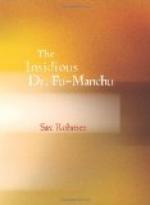I took it from his hands, and was about to examine it, when a loud voice sounded outside in the hall. The door was thrown open, and a big man, who, despite the warmth of the weather, wore a fur-lined overcoat, rushed impetuously into the room.
“Sir Lionel!” cried Smith eagerly. “I warned you! And see, you have had a very narrow escape.”
Sir Lionel Barton glanced at what lay upon the floor, then from Smith to myself, and from me to Inspector Weymouth. He dropped into one of the few chairs unstacked with books.
“Mr. Smith,” he said, with emotion, “what does this mean? Tell me—quickly.”
In brief terms Smith detailed the happenings of the night— or so much as he knew of them. Sir Lionel Barton listened, sitting quite still the while—an unusual repose in a man of such evidently tremendous nervous activity.
“He came for the jewels,” he said slowly, when Smith was finished; and his eyes turned to the body of the dead Italian. “I was wrong to submit him to the temptation. God knows what Kwee was doing in hiding. Perhaps he had come to murder me, as you surmise, Mr. Smith, though I find it hard to believe. But—I don’t think this is the handiwork of your Chinese doctor.” He fixed his gaze upon the sarcophagus.
Smith stared at him in surprise. “What do you mean, Sir Lionel?”
The famous traveler continued to look towards the sarcophagus with something in his blue eyes that might have been dread.
“I received a wire from Professor Rembold to-night,” he continued. “You were correct in supposing that no one but Strozza knew of my absence. I dressed hurriedly and met the professor at the Traveler’s. He knew that I was to read a paper next week upon”— again he looked toward the mummy case—“the tomb of Mekara; and he knew that the sarcophagus had been brought, untouched, to England. He begged me not to open it.”
Nayland Smith was studying the speaker’s face.
“What reason did he give for so extraordinary a request?” he asked.
Sir Lionel Barton hesitated.
“One,” he replied at last, “which amused me—at the time. I must inform you that Mekara—whose tomb my agent had discovered during my absence in Tibet, and to enter which I broke my return journey to Alexandria— was a high priest and first prophet of Amen—under the Pharaoh of the Exodus; in short, one of the magicians who contested in magic arts with Moses. I thought the discovery unique, until Professor Rembold furnished me with some curious particulars respecting the death of M. Page le Roi, the French Egyptologist—particulars new to me.”
We listened in growing surprise, scarcely knowing to what this tended.
“M. le Roi,” continued Barton, “discovered, but kept secret, the tomb of Amenti—another of this particular brotherhood. It appears that he opened the mummy case on the spot— these priests were of royal line, and are buried in the valley of Biban-le-Moluk. His Fellah and Arab servants deserted him for some reason—on seeing the mummy case—and he was found dead, apparently strangled, beside it. The matter was hushed up by the Egyptian Government. Rembold could not explain why. But he begged of me not to open the sarcophagus of Mekara.”




